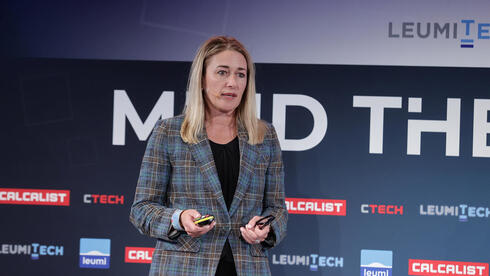
Mind the Tech NY 2024
“If AI models were adopted by all lenders nationwide in the US, we could witness an additional $330 billion in GDP annually”
“Pagaya's objective is to encourage the banking ecosystem to adopt more artificial intelligence," added Leslie Gillin, Chief Growth Officer at Pagaya
Leslie Gillin
(Photo: Orel Cohen and Tomeriko)
"I'm going to discuss access to credit for Americans, as well as artificial intelligence," Leslie Gillin, Chief Growth Officer at Pagaya, began her remarks at the Mind the Tech conference in New York.
Gillin proceeded with a story: "I want to tell you about a 35-year-old woman from Texas, whom we'll call Nancy. Nancy needs $8,000 in repairs for the home she shares with her husband and their two children. The roof requires repair, and the house's old heating system needs replacing. So Nancy did what Americans typically do - she went to the bank and applied for a loan. She has a full-time job paying her $70,000 a year. She holds a mortgage, a car loan, and two credit cards, and Nancy hasn't missed a single payment in the past five years. Despite these factors, and despite having $100,000 in her bank account, Nancy's loan application was rejected."
Gillin mentioned that she has encountered this scenario frequently during her career: "I entered the fintech industry after working for over 30 years in banking, at some of the largest banks globally. I managed a credit card company, one of the largest credit card businesses worldwide, consistently focusing on loan matters. However, we never integrated AI into the credit industry. Pagaya, the company I currently work for, aims to provide more credit to more Americans. My role involves enhancing the utilization of AI in the banking ecosystem."
Gillin then reviewed the state of the American credit market: "A report by the federal government released last year revealed that 24% of consumers didn't even apply for a loan because they were certain of rejection. 37% of Americans were indeed denied, mainly due to their credit rating. In the fourth quarter of 2023, 60% of households in the United States reported it was more challenging to obtain a loan than the previous year. Credit is essential in the American economy for participation and prosperity. Without adequate credit, acquiring a car, buying a home, or even renting an apartment becomes difficult. Furthermore, obtaining a loan to expand a business is often impossible for 25% of active businesses."
According to Gillin, if banks fail to implement AI, they will overlook individuals like Nancy, primarily focusing on their credit score and denying them loans. However, if Nancy's bank utilized AI, they would analyze hundreds of data points in real-time and likely approve her loan. This is why Gillin believes that "artificial intelligence can transform people's lives."
Later, Gillin presented Pagaya's data from the last two years, showing $15 billion in loans granted to those previously denied: "When we examine individuals initially rejected for credit but later approved thanks to Pagaya's AI model, we find that 55% of them have low or moderate incomes, 50% are women, and 36% are Black or Hispanic. Extending credit to these demographics is not only ethical but also an official objective of major US banks. Currently, consumer loans constitute 12% of the total gross domestic product of the USA – $3.3 trillion. If AI models were adopted by all lenders nationwide, we could witness an additional 10%, $330 billion annually. Pagaya's objective is to encourage the banking ecosystem to adopt more artificial intelligence."















